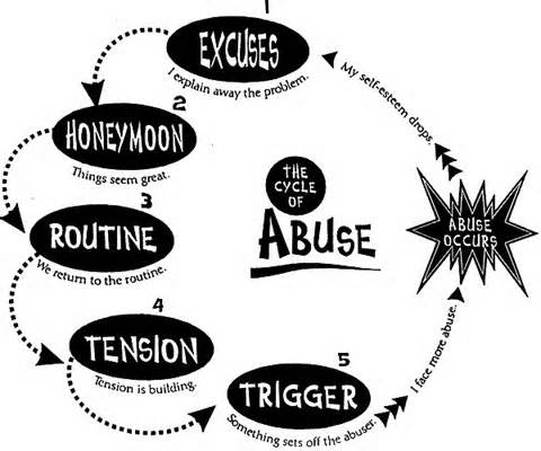Give and receive
For me, one of the hardest things in life is to ask for help, and I’m not talking about “pass … Read More
Tel/Whatssap (+34) 678222694 | Email: natalia@nbelousova.com
For me, one of the hardest things in life is to ask for help, and I’m not talking about “pass … Read More
Resistance is a mechanism of psychological defense, which, on the one hand, protects us from realizing such information about ourselves … Read More
The hypothesis about the existence of this effect was put forward in 1999 by American social psychologists Justin Kruger and … Read More

“Objectification” in the context of relationships means contact in which one person sees in the other not a person, but an “object”, an object for the embodiment of his own desires. Anyone who does this is in an immature position. It takes a certain degree of maturity, growing up, to begin to see people in a complex, not fragmented way.
Healthy development includes respecting others as people with their own rights, needs, limitations, good and bad traits. A man or woman who views another person as an object and looks at him solely from the point of view of satisfying his own needs is not capable of healthy, mature relationships, especially romantic or sexual ones.
People prone to objectification are less capable of empathy than others. A person who sees others holistically can look at the world through the eyes of another, notice similarities and differences with him, recognize strengths and weaknesses, likes and dislikes. These abilities determine the ability to sympathize and take another person’s point of view. It is difficult for a person who sees another as an object or function to have compassion and take the other’s place.
Objectification depends on the degree to which the child has been emotionally accepted or rejected by his immediate environment. If his needs were not met during childhood, the individual will feel insignificant, incompetent and unworthy of love. The understanding of the subject is connected by a person’s attitude towards himself as an independent, active figure.
Subjectivity is a category in psychology that expresses the essence of a person’s inner world, the possibility of creative transformation of the surrounding reality, the expression of one’s own opinion, emotions, feelings, based not on how it should be, but on how the subject himself thinks and feels.
Subjective relationships represent the interaction between people based on the recognition of each of them as an individual with their own unique needs, rights and values. In such relationships, people consider each other’s individuality and strive for mutual understanding, cooperation and respect.
Objectified relations can be compared to commodity-money relations. In such a relationship, one person views the other as an object that can be used or exchanged for something to satisfy his or her own needs, just as goods are exchanged for money. The value and significance of another person is determined solely in the context of obtaining benefits or satisfying one’s own interests. Such relationships lack recognition of the other person’s individuality, uniqueness, and rights, making them unhealthy and lacking depth.

A psychologist must have a strong theoretical foundation and understanding of psychological concepts, methods and techniques. Insufficient education or a frivolous approach to training can lead to inadequate understanding of the client’s problems, incorrect diagnosis and incompetent assistance.
Lack of supervision can result in missed valuable opportunities for learning, reflection and improvement of practice. Learning new methods and techniques, as well as analyzing individual situations with a supervisor, expands the possibilities in working with a client, allows you to avoid mistakes and correct any difficulties that arise in a timely manner.
Empathy is great, but experiencing the client’s problems as one’s own can lead to a shift in focus to one’s own experiences and limit the professional’s ability to maintain objectivity and independence in the work.
The inability to establish financial relationships with clients and working for free lead to rapid burnout, as well as a decrease in the assessment and recognition of the professional skills of a psychologist. Free, regular help also does not help the client take responsibility for the recovery process.
In the quest of a novice psychologist to radically improve a client’s life, one must always adhere to the principle of moderation and proceed from the client’s request. Setting clear and realistic therapeutic goals is an important aspect of a psychologist’s work. It is necessary to be able to listen and understand the client’s needs in order to formulate goals that will be aimed at solving the problems expressed by the client.
It is important to understand that the psychotherapeutic process requires time and gradual development, as well as systematic and in-depth exploration, working on symptoms and developing new skills and understanding. Psychotherapy can be a process spanning several sessions, several months, or even several years, depending on the complexity and nature of the client’s problem.
Failure to set boundaries can lead to a violation of ethical standards and even the creation of a dependent relationship with the client. Clear time frames for the session, a preliminary agreement on the terms of therapy, the opportunity to write between sessions – all of this helps create a clear framework in which there is clarity and safety.
Working with psychological needs implies a high level of trust and openness; the psychologist actually acts as a parent, an adult on whom the client can rely; abuse of trust causes irreparable harm to the client. The client’s romantic feelings towards the psychologist are most often due to transference. If a psychologist cannot cope with his feelings, he needs to undergo supervision and redirect the client to another specialist.
The consultant’s task is to help the client learn to make responsible decisions independently. The client will be able to come to a solution to his problem not if he receives a ready-made recipe or algorithm of actions, but will be able to identify the origins and underlying reasons for his actions.
It is important to understand that self-confidence without proper self-analysis and personal therapy can become an obstacle to effective psychological help. Regardless of experience and status as a psychologist, a professional must constantly strive for self-development.
Without self-analysis and personal therapy, a psychologist may miss the opportunity to resolve his own emotional and psychological problems, to see his own stereotypes and prejudices, which can affect his work with clients, objectivity and impartiality.

After working with clients who have survived abusive relationships, I see a paradoxical but interesting feature: people who have survived such relationships perceive negative attention as something meaningful and important. In a toxic relationship, the abuser gives mixed signals, creating a sense of intense passion and attention, even if that attention is destructive.
When such clients try to leave and create new relationships where there are no extreme displays of attention, they develop a feeling of emptiness or boredom. After all, healthy relationships are based on respect, care and mutual understanding, and do not always manifest themselves through dramatic scenarios and emotional rollercoasters.
Abusive displays of attention, although seemingly intense, actually represent a distorted view of love. They create dependence and control, emotional swings from alienation and coldness to passionate scenes. A person gets hooked on a hormonal needle. In a healthy relationship, true love is shown through respect, support and care, not through toxic drama and manipulation.
People who experienced neglect and attachment trauma in childhood did not receive the emotional support and security they needed from their parents or caregivers. This results in an unstable attachment pattern where they seek comfort, validation and support in relationships but have difficulty setting healthy boundaries and recognizing their needs.
This has a huge impact on their understanding of love and affection in adulthood. They may end up in abusive relationships by seeking the same form of attention they received as children. Sometimes they may even justify their partners’ negative behavior as a sign of care or attention, because that’s the only thing they’ve ever known. Due to the lack of healthy models in childhood, they may not recognize warning signs or succumb to the feeling that this behavior is normal. The world is becoming upside down, concepts are being replaced. When the only form of attention available in childhood was through criticism and negativity, children grow up accustomed to the fact that yelling, devaluation, or even physical assault is better than complete indifference.
The person may begin to doubt themselves, feel that they deserve such treatment, or that they are not capable of healthier relationships. Moreover, abusive relationships can be both emotionally toxic and physically draining. Often, a person in such a relationship may feel constant stress, anxiety and worry, which leads to emotional and physical exhaustion, and constant retraumatization.
If you recognize yourself, it is important to remember that it is not your fault, but your responsibility. What can you do about it to improve your quality of life and relationships in the present?
Working on yourself and seeking help in therapy can play a huge role in re-evaluating your beliefs so you can set new, healthy boundaries for yourself and attract positive, supportive relationships into your life. This is a difficult but important step towards breaking free from stereotypes and building a healthier future.
Breaking free from such relationships can be a difficult but important step toward rebuilding your self-esteem and regaining emotional stability. The process begins with recognizing that the relationship is harmful and seeking support—whether through friends, family, or professionals. Gradually, through working on yourself and your environment, you can begin to restore your self-esteem and believe in your own worth.
 Hello! My name is Natalia Belousova. I was born in Moscow, but living since 2005 in Barcelona. my profession that I love is psychotherapist. I work with the emotional world of people. I am Gestalt-therapist, specialist in Systemic Family Constellations, specialist for Therapeutic Work with Dreams and relationships between a man and a woman. I receive individually, consult couples and lead therapeutic groups. There are a lot of spheres of interest in my life (I am linguist and interpreter-translator for my first education, I love fashion and beauty industry, multimedia, I studied advertising, worked in administrative positions, as foreign languages teacher and even as a cabin crew), all these was a way to find my do something that was my predestination, and what was a hobby for a long time became my profession. I like to contribute to make this world better, so that people live a fuller and a more conscient, happy and healthy life. From all the things that I did in life (I study and work since I was 17) I learned something, developed myself, got to know me better, and got to understand what I really want to do in life. I will publish in 3 languages: English, Russian and Spanish. Hope you will like my posts and be my follower!
Hello! My name is Natalia Belousova. I was born in Moscow, but living since 2005 in Barcelona. my profession that I love is psychotherapist. I work with the emotional world of people. I am Gestalt-therapist, specialist in Systemic Family Constellations, specialist for Therapeutic Work with Dreams and relationships between a man and a woman. I receive individually, consult couples and lead therapeutic groups. There are a lot of spheres of interest in my life (I am linguist and interpreter-translator for my first education, I love fashion and beauty industry, multimedia, I studied advertising, worked in administrative positions, as foreign languages teacher and even as a cabin crew), all these was a way to find my do something that was my predestination, and what was a hobby for a long time became my profession. I like to contribute to make this world better, so that people live a fuller and a more conscient, happy and healthy life. From all the things that I did in life (I study and work since I was 17) I learned something, developed myself, got to know me better, and got to understand what I really want to do in life. I will publish in 3 languages: English, Russian and Spanish. Hope you will like my posts and be my follower!
First of all let’s clarify what an eclipse is. An eclipse is a shadow that casts one object in the space on another. A Lunar Eclipse occurs when the Moon passes through the shadow of the Earth. For this to happen the Sun, Earth, and Moon must be closely aligned with the Moon. There are a few different types of Lunar Eclipse that are determined by the quality and quantity of the to the shadow of the Earth: total, penumbral and umbral. The Eclipse can occur only on a full Moon and can be viewed only from certain regions of the earth. Although specialists do not recommend to look at the eclipses and say it can even damage the sight. On the 23-d of March there took place a penumbral lunar eclipse.

On the natal chart the eclipse will be reflected like this (see the below picture). The Moon and the Sun are identified by red colors. That means that a child who born at the moment of the eclipse on the 23 d of March will have this natal chart. Here you can graphically see that there is an opposition between the two luminaries.
I would like to share with you an interesting fact. I started this blog the day of the Eclipse, or if to be more exact once finalized the corridor of the eclipses that started on the 9th of March and finished on the 23d of March. Below you can see the picture from my window the night 23-24 of March, although the last eclipse took place during the day 11:48 GMT time, 14:48 Moscow time. For me it means going on the new level. The beginning of the new cycle. The Moon is a feminine planet. In the natal chart represents the emotional world, a woman, a mother, a wife, the children. The Moon influences much more women than men. It is well known that even the quantity of births rise dramatically during the fool Moon. It is good to know that the eclipses are the good period for renewing, for spiritual cleaning of our inner self (negative guidelines, out of dated customs, non productive relationships). Also the eclipses take on the surface the hidden potential and give the courage to implement it in life. Eclipses are the time for change, becoming conscious of one’s own limitations, symbolic death and resurrection.
Also I would like to highlight an interesting fact that this lunar eclipse is finalizing the period initiated by a Sun Eclipse in October 2005. In other words everything you started in October 2005 is now coming to its logical finalization. For me it’s very symbolic because in October 2005 I arrived to Barcelona and started studying psychotherapy, dreams, astrology and all these alternative therapies, I will be describing in this blog. For me finalized a period of getting and ccumulationg the knowledge and is opened a new one of sharing them. I advise you to see what is it that you are finalizing now after 11 years and what is the new stage you want to initiate.